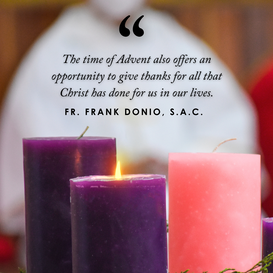 Many people do not like to wait. Western culture is instant. Waiting in line or waiting for something to arrive often creates impatience. The oft said line “patience is a virtue,” seems not to apply. We want whatever the thing is according to our schedule. God’s time, though, is not our time. We can be as impatient as we wish, but God will decide when the time is right. We need to decide if we are willing to wait, trust, and prepare. Christ is in our lives and wants to deepen his presence in us. Advent offers us a time to patiently wait for Christ who will come at the end of time and the one who is already incarnate among us which is what we celebrate at Christmas. The time of Advent also offers an opportunity to give thanks for all that Christ has done for us in our lives. It is a call to conversion of heart and deeper life in him. This is part of our preparation as we patiently wait. Conversion of heart may be a call to the Sacrament of Penance, so that we can receive the Eucharist in fuller love and openness. The Catholic Apostolate Center provides many resources for the Advent and Christmas seasons. We invite you to explore them and hope that they assist you in your preparation and waiting. For those in the United States, may you have a blessed Thanksgiving. For all, may you have a good and prayerful beginning to the Advent season. In God, the Infinite Love, Fr. Frank
0 Comments
We’re well into the first week of Advent, and if you’re like me, you’re probably sick of all the Christmas displays and music and consumerism that has bombarded our senses since November started. As an American, it’s always been easy for me to get pulled into the secular world’s excitement about Christmas, its eagerness to get started with all the partying, eating, gift swapping, caroling, and general Christmas cheer. But as I’ve deepened my faith as a Catholic, I have found that the more focus I put on Advent as a time of preparation for Christmas, the easier it is to block out the unending secular Christmas noise and ready my heart, my home, and my family for the coming of the Christ child. For most people, the phrase “preparing for Christmas” probably evokes memories of setting up Christmas trees and hanging lights outside, wrapping gifts, or organizing the ideal Christmas classics playlist. And while those things certainly count as preparation for Christmas, won’t we suffer burnout—or what I have seen referred to as “the holiday hangover”—if we spend all of November and December with our house decked out for Christmas and with Christmas music playing all day long? I know I would. A few years ago, as I was researching Catholic Advent traditions that I could incorporate into my family’s liturgical life, I decided that I ought to shift our emphasis from when to set up the Christmas décor and instead focus on the spiritual longing and the growing excitement for the arrival of the Messiah. Traditionally and liturgically, Christmastide lasts many days—at the very least until the Epiphany, but usually until the Baptism of the Lord. Why not leave the Christmas celebrations until Christmastide and focus on the preparation during Advent? Israel spent countless years in hopeful anticipation of the savior—is it really so difficult for me and my family to spend four weeks emulating that same sense of joyful expectation? The Catholic Church has so many symbols and traditions from which we can draw to prepare our hearts and homes for Christ. In our house, we not only light the Advent wreath every night, but we darken the dining room lights in order to emphasize the light that Christ brought when he came into the world. We also recently implemented the Jesse Tree—a tradition I did not grow up with, but one that I have come to love because it condenses salvation history into a timeline that is easy even for my children to follow. We don’t listen to Christmas music during Advent, choosing instead to listen to Advent music. We read children’s books that discuss the animals’ preparing the barn before the Nativity, or the journey that Mary and Joseph took before Jesus was born. When we experience Advent in this way, the anticipation for Christmas builds with each passing week. As Christmas Day draws closer, we start baking and freezing the Christmas cookies to be eaten during Christmastide and to be given as gifts at Christmas parties. I take time to plan out special activities for us to do during the twelve days of Christmas, or special meals I know everyone will enjoy during that time. We pray the O Antiphons. We make or buy gifts for our loved ones, and we talk about how giving gifts to our loved ones is a reflection of the great gift of Jesus, who was given to us on Christmas Day. In this way, when we finally decorate the house on Christmas Eve, we are all practically bouncing with excitement—and not just about presents, but about the miracle of Christ’s birth. Our children’s—and our own—sense of wonder is bolstered and preserved by our not celebrating too early. By steeping ourselves in the history of the first Christmas and by maintaining that same sense of watchful hoping and waiting, we can more fully appreciate the wonder of the arrival of the promised Messiah. There’s a lot of preparation that goes into the holiday season. It seems in our secular society as soon as the calendar changes to November that the world begins buzzing with cooking, baking, buying, wrapping, and planning. Our calendars overflow with gatherings and obligations and before we know it, it’s a new year. As Catholics, we know that this time of year tells a different story. However, the loud hubbub of secular holiday cheer swirling around us can make it difficult to proclaim it, even to ourselves. What would it look like in our daily lives over these next few weeks if we as Catholics challenged ourselves, in this season of frenzied preparation, to prepare ourselves to wait? What might that look like? Here are a few steps that we can take. OBSERVE We cannot decipher what steps to take if we do not spend the time observing where our current steps are leading. Take some time over these next few weeks to observe your spiritual and physical life. Make note of the areas of your life that you feel you are consistently inviting the Holy Spirit to be a part of and those areas in which He has not received an invitation. Notice the time of day or week that anger, frustration, hurt, or anxiety creep into your heart and mind. Where are your moments of joy, praise, and thanksgiving? How are you caring for your physical body and its environment? Observe how you are fueling your body and your mind. Is the source and substance of that nourishment strengthening your body and mind to be the best version of yourself? Are you spending moments in joyful movement, whatever that may look like for your body, in praise and thanksgiving of the vessel that is fearfully and wonderfully made? Simply take time to observe and collect information on your current state. Try not to put a label or judgment on your observation, but rather work to build your awareness. REFLECT Once you have collected your observations, spend some time reflecting on this newfound information and present it at the foot of the Cross. Implore the Holy Trinity to open your eyes and your heart to reveal to you the areas in your life that could be improved or strengthened. Ask for divine intervention to reveal to you the strengths that you possess and the gifts and talents that have been given to you. How might you utilize these strengths, gifts, and talents to bring life and light to those areas of your life that may be lacking? Be patient in your reflection. Do not be afraid of silence! It is often within the quiet of silence that He will make His presence known to you. Allow this prayerful, reflective time to turn your observational information into knowledge. ACT It’s time to turn that knowledge into a plan. Through your observation and reflection, you will have gathered the necessary tools to be able to move forward in your journey. Carry the strengths that have been revealed to you and humbly face the shortcomings that you have observed. What does action look like for your journey? What steps are required to strengthen areas of your spiritual and physical life that may be lacking? Put your plan into practice and remain vigilant and prayerful of the different ways that you can tweak your plan. WAIT We have spent the remaining weeks of the liturgical year in observation, reflection, and action… and now we wait. As you enter into the Church’s new year and the season of Advent, commit to the action plan you have created and joyfully await the celebration of the birth of YOUR Savior. If you’ve put the work into the first three steps, you will find that your action plan is in fact leading you to prepare for the tiny babe wrapped in swaddling clothes. “For a child is born to us, a son is given us; upon his shoulder dominion rests. They name him Wonder-Counselor, God-Hero, Father-Forever, Prince of Peace.” (Isaiah 9:5) Prepare to wait. Prepare the way. Prepare the place and invite Him to take residence in you – body, mind, and soul. For more resources to accompany you during this Advent season, please click here. “Jesus returned from the Jordan and was led by the Spirit into the desert for forty days, to be tempted by the devil...” - Luke 4:1-13
In each of the Church’s Liturgical Seasons we have an opportunity to examine ourselves and reflect on different aspects of Jesus’s life. During Lent we create a space to reflect on His suffering and sacrifices. In today’s Gospel reading the Spirit led Jesus into the desert. For forty days Jesus lived in the wilderness, and faced the devil’s temptations. He was tempted with pride, power, and popularity; however, Jesus knew that He was called to follow God’s will and resist the empty promises the devil offered. I find comfort that the Holy Spirit led Jesus into the trial. The forty days were meant to prepare Jesus for the work that was to come, and a part of that preparation included temptations. Jesus relied on His knowledge of the scriptures and combatted the temptations with Truth. Turning a stone into bread seems like an innocent action, but Jesus knew that the temporary satisfaction would be empty and in defiance of God’s will. Jesus understands what it means to face temptation, and in His resistance provides a model of following God’s will that we should all ascribe to. Jesus was tested, and responded without sin. When I find myself facing a trial, I can draw comfort in the knowledge that the same Holy Spirit that led Jesus into the wilderness is in me. In His resistance in the wilderness, we have a foretaste of Jesus’s victory to come. At Easter we celebrate Jesus’s victory over death; in the meantime Lent provides us with a time to fast and prepare our hearts for the inevitable temptations of the world. Lent provides us with the opportunity to spend forty days in our own “wilderness”, fortifying our own hearts through sacrifice and prayer. FOCUS: COMMUNITY Throughout Lent we focus on all that Jesus has done for us. In today's Gospel we see that Jesus resisted each temptation, not just for Himself, but for us. Each of the temptations the devil proposed were designed to distract Jesus from His humanity. Each temptation involved Jesus using His divinity for personal gain and separating Himself from the human community. The temptation of individualism is something that we are all called to resist. The Lord created us as social beings with a responsibility to care for one another. WHO INSPIRES YOU TO SERVE? My Mom has always been a model of service I aspire to follow. She embodies the principle of placing others first, stressing to me and my siblings that “where your treasure is your heart will also be.” Mom’s treasure is rooted in the love she has for our community, and it is important to her that she actively invests her time to show the love. It could be as simple as caring for our school garden, or as involved as organizing our Church’s homeless outreach ministry. Mom has always found a way to make time for the causes that matter to her, and in doing so has shown the importance of committing time and resources to love others in her care for all of God’s Creation. PRAYER: Lord, you created us to love and worship. Help me cling to the truth that I am Yours in the midst of trials. When I walk through the valleys help me remember the joys from the mountain tops, and place my hope in the knowledge that Your will is for my good. Stir in me a heart that longs to discern Your will. Help me to work Your justice rather than personal gain every day of my life. Bless our bodies for Your service, and our service for Your Glory. To view the entire 2019 Lenten Guide, please click here. For more Lenten resources, please click here. Mara Scarbrough, Bon Secours Volunteer Ministry The next forty days of Lent are Mother Church’s annual call to intense prayer, fasting, and almsgiving oriented towards embracing God as the center of one’s life and repenting of all which distracts us from Him. With the current crisis for the Church in the United States, it seems that the Church could really use a good spiritual renewal, cleansing, and renunciation of sin often focused on during the season of Lent. As parts of the Body of Christ[1], we are all too aware how an affliction experienced (or caused) by one part affects us all. Recall the words of St. Paul, “Rejoice with those who rejoice, weep with those who weep... Do not be conquered by evil but conquer evil with good.”[2] The Church is suffering but, just as she always has, she will ultimately be restored for the glory of God. As laity, you and I are key to addressing this scourge, along with the Church’s holy clergy and religious, and to affirming God’s presence in our lives not just in the Lenten season, but every day.
Though a time of repentance, Lent is not a time of despair or hopeless suffering; this season reminds us that God, although saddened by our repeated failings, never closes Himself off from offering mercy and love to the broken, the sinner, and the lost. Lent is not a diet, nor a fad of living without something trivial, nor even a temporary spiritual renewal; it must take root—free from the sin which prevents this—and be nourished over the coming weeks to strengthen us throughout the whole year. Above all, Lent prepares us for the celebration of Easter. Christ has died, Christ is risen, Christ will come again; the Church suffers, the Church is renewed, the Church shall be restored! The abuse scandal today may cause people to feel abandoned, angry, confused, and sad. “How can this be happening?” is certainly a question in our hearts and homes these days. It is important to remember that Jesus Christ, the same “yesterday, today, and forever,”[3] reigns over the Church. He is omnipotent, divinely good, and eternal; Let us take courage in the truth that our faith is ultimately in Jesus Christ. Because our Lord remains faithful to us[4] and ever close to His bride, the Church, He gives us the strength to recommit ourselves to renouncing the evil in our sight that threatens to drive us away from God and His Church. Lent is the perfect opportunity to facilitate spiritual renewal, not only for ourselves but also for the greater Church. Following the example of Jesus’ time in the desert before commencing His public ministry, the faithful are invited to reflect on the state of the Church, pray for strength, courage, justice, and healing, and even seek accountability in the governance of the Church. Personal penance can be made for our own failings, but reparation must also be made to address this scandal and to unify God’s people to prayerful and peaceful action in seeking God’s healing grace to move forward. Over the next 40 days, let us care for the Church by promoting healing among ourselves, supporting the afflicted and needy, addressing sin and divisions, and always proclaiming Christ to each other and the world. For more resources to accompany you throughout the Lenten season, please click here. [1] cf. Lumen Gentium, 33. [2] Romans 12:15, 21. [3] Hebrews 13:8. [4] cf. 2 Timothy 2:13. Happy New Year! We have officially brought the Church year to a close and have entered into a new liturgical year with the first week of Advent. It is a time of new beginnings and yet a profound time of waiting and preparation as we anticipate the joy of the birth of a tiny babe in a manger. I find it interesting that this time of waiting comes right at the beginning of the new liturgical year. In the secular world, New Year’s celebrations are immediate and urgent. We count down to the strike of midnight, kiss our loved ones, announce our resolutions, and toast the entrance of the next phase. Some of us celebrate the end of another passing year with relief. Some feel a deep hope and longing that the year to come will bring with it some rest and release from the trials and tribulations of the previous year. Others celebrate the successes of the year and look forward to hopeful continued success. No matter which category you fall into, the secular New Year brings with it some sense of urgency, of immediate change. In the Church’s liturgical year, we celebrate our “New Year’s Eve” with the celebration of Christ the King on the last Sunday before Advent. In Pope Francis’s 2013 homily he reminded us, “Jesus is the center of creation; and so the attitude demanded of us as true believers is that of recognizing and accepting in our lives the centrality of Jesus Christ, in our thoughts, in our words and in our works.” Pope Pius XI instituted this celebration in 1925 to help remind us that, “while governments and philosophies come and go, Christ reigns as King forever.” Can you feel it? Can you feel the excitement, hope, and assuredness infiltrating you as a believer of Christ, King of the Universe? And then we wait… This stark contrast brings with it the perfect time for reflection and re-evaluation. In thinking and reflecting on the Advent season at the beginning of this new liturgical year, I’m struck by the images that come to mind. The slow burn of a candle in the window, darkness in anticipation of the light of morning. We are searching, seeking, wanting, waiting. “Not all who wander are lost,” J.R.R. Tolkien wrote. Over the years it has become a fairly well known quote. How does this quote speak to you this Advent season? At times we may wander through the ebb and flow of our daily lives and this quote seems to reach out to us in an attempt to comfort us when we find ourselves in this place. But let’s take a deeper look at this particular quote. What does it mean to wander? To wander is to walk or move in a leisurely, casual, or aimless way. In what areas of your life have you been wandering? More importantly, do you know where you are going? Advent is the perfect time for reflection and re-evaluation. “Not all who wander are lost.” Is it true? Sometimes we need the casual and the leisurely. It can be good to have a moment to take a breath. This time of Advent at the beginning of our new liturgical year, though, is a time to challenge ourselves. Are we still wandering? Have we lost sight of our aim? Perhaps Advent is calling us out of our time of wandering and into a time of wondering. To wonder is to desire or be curious about something; to feel amazement, to marvel. What is your heart longing for this Advent season? Where in your life are you being called into a deeper relationship with Christ, King of the Universe? He is coming and His desire to know and love us is so great that He is coming as a vulnerable and dependent baby in a manger. “They name him Wonder-Counselor, God-Hero, Faith-Forever, Prince of Peace.” (Isaiah 9:5) He is coming. Are you ready? This season, let us remember, all that WONDER as they behold the Christ child will never be lost. Question for Reflection: What is your heart longing for this Advent season? For resources to prepare you for the Advent season, please click here. The candy has gone on sale, the post-Thanksgiving “leftover sandwich” has been eaten, but it’s not time to deck the halls just yet. As many prepare for the joyful season of Christmas, complete with mall Santas, holiday movies, and plans to celebrate the Nativity of Jesus Christ, the Church prepares during the season of Advent. This time isn’t just for buying gifts and putting up the tree, but to prepare ourselves spiritually for the coming of Christ. This season of preparation can be traced back to 4th century France, though the Advent we are familiar with can be traced back to Pope Gregory I and Rome in the 6th and 7th centuries. Whereas Lent is a time of penance for Christians, Advent is a time of preparation and hope. Not only do we prepare for the birth of the Lord, but we also look to the Second Coming of Christ. The first coming of Jesus at Christmas opened the doors for our salvation and prefigures his Second Coming. It is because of this hope that Advent focuses on light and not darkness. This light can be symbolized in the Advent wreaths that adorn Churches and the houses of the faithful. The four candles represent the four weeks of Advent, three purple and one rose. The purple candles represent prayer and sacrifices that are undertaken in preparation for the coming of Christ. The rose candle, lit on Gaudete Sunday (the third Sunday of Advent), is a symbol of rejoicing as the faithful have reached the midpoint of the season. When we thank God for the forgiveness of our sins and for the chance to be with him for all eternity in Heaven, we often think of Easter, but Christmas is necessary in the plan for our salvation as well. Before Christ could suffer and die for us, achieving our redemption and the path for our salvation, he had to become man. What a gift this is! If you follow the Franciscan theology of the incarnation as proposed by Bl. Duns Scotus, Christ would’ve become man with or without the original sin of Adam and Eve, but his mission of salvation makes his Incarnation that much more special for us. As Pope Benedict XVI said at a General Audience, “[Bl. Duns Scotus] reaffirmed that the Incarnation is the greatest and most beautiful work of the entire history of salvation.” Jesus, the God of all the universe, became man. But he did not just become a man—he became a vulnerable baby born in a manger. As we encounter him every time we partake in the Eucharist, let us pray and meditate upon the fact that God became vulnerable for us. God loved us so much that he became man. Years after his birth in a manger, he took on our sins so that we may be with him forever. Just as we prepare to receive him into our bodies when we receive the Eucharist, let us prepare to receive the Lord into the world this Advent and make ourselves more worthy of him. Advent is our time to come closer to Christ, to meditate on how he is present in our lives, and to see how he has called us to live with our fellow man as we await his Second Coming. While prayer, fasting, and almsgiving are certainly emphasized during the season of Lent, they can also be integral parts to our preparation for Christmas. May we pray for Christ to be present in our lives and for us to do his will at all times; may we fast from the things that lead us away from him; and may we give alms to those who are less fortunate than us. In these ways we prepare for Christ during Advent as we await both his Nativity and his Second Coming. Question for Reflection: What are some Advent traditions that have helped you prepare for the coming of Christ? For more resources to help you throughout the Advent season, please click here. For some, Palm Sunday was a political event surrounding a political person that led to the greatest, most unexpected revolution the world has ever seen happen. Historically, the week leading up to Jesus’ Passion would have been the time of preparation for Passover, when many Jews from all the surrounding villages were in Jerusalem together. The gospels (Mt 21: 1-11) describe Jesus’ triumphant entrance into Jerusalem to the swaying of palm fronds and shouts of “Hosanna!” These were unmistakable prophetic signs of the Messiah-king, the one many Jews expected would finally overthrow their Roman overlords and re-establish Israel’s reign on earth, perhaps even violently—as a group called the “Zealots” expected. Yet there is a further symbol to this story: Jesus riding on a colt or ass, the sign of a humble and meek king. Jesus did not become the king they expected, but instead, the one God wanted. As Pope Francis said in his 2016 homily on the Feast of Christ the King, “The Gospel in fact presents the kingship of Jesus as the culmination of his saving work, and it does so in a surprising way. ‘The Christ of God, the Chosen One, the King’ (Lk 23:35,37) appears without power or glory: he is on the cross, where he seems more to be conquered than conqueror.” Like Jesus’ followers then, today we are susceptible to temptations of limited expectations. It is possible to see Jesus merely as a political and ethical teacher who died a martyr’s death and nothing else. On the other hand, we might project Jesus’ kingdom to a purely “other-worldly” realm. Since Jesus apparently wasn’t setting up his kingdom on earth (so we assume), we are tempted to sanitize Jesus of any “worldly” political or practical implications, and simply assume political engagement has limited place, or even runs counter to our task of evangelization. As Pope Pius XI wrote in his establishment of the Feast of Christ the King, “It would be a grave error…to say that Christ has no authority whatever in civil affairs, since, by virtue of the absolute empire over all creatures committed to him by the Father, all things are in his power…although he himself disdained to possess or to care for earthly goods, he did not, nor does he today, interfere with those who possess them.” Both interpretations—that Jesus was strictly political or that his work was merely “not of this world”—fail to take seriously not only Jesus’ public ministry and preaching, but the truly earth-shattering consequences of Jesus’ kingship won at the cross. The Catechism of the Catholic Church states that Christ, “exercises his kingship by drawing all men to himself through his death and Resurrection.” Jesus’ death and Resurrection are, simply, God’s victory over the world’s powers of sin and death so as to bring about the restoration of God’s people. To say yes to Jesus’ Resurrection is to say yes to life as part of a new creation and kingdom that starts now. Paschal faith involves the risk of making mistakes, being misunderstood or ridiculed, of not conforming to the expectations of the surrounding culture in order to expect something greater. It involves joining in the kingship of Christ in serving others, something we are able to share in as a result of our baptism. As powers of sin and death today loom heavy on our hearts, it is not enough to “have faith” but to do nothing. Following Christ calls us to witness to our faith in practical ways with full conviction because of Christ’s own experience of suffering, death, and Resurrection that has transformed our fundamental orientation to the world. As Christians, we desire peace, healing, reconciliation, and restoration. We serve our King by building up his kingdom on earth. Pope Francis challenges us, “A people who are holy…who have Jesus as their King, are called to follow his way of tangible love; they are called to ask themselves, each one each day: “What does love ask of me, where is it urging me to go? What answer am I giving Jesus with my life?” For more Lenten and Easter resources, please click here. Can you sense something’s coming? Throughout Lent, we’ve had the opportunity to empty ourselves in prayer, fasting, and almsgiving; we have mirrored Christ’s journey in the desert after His baptism. These past forty days have called us to remember to turn to God for His grace in our lives and for a spiritual renewal to cleanse us of all that distracts us from Him. While pouring ourselves out spiritually takes time to occur and be effective, so too should we scrutinize how we are replenishing ourselves in preparation for Easter.
The Church is on the verge of commemorating the week that changed the world: from Palm Sunday through Easter Sunday, the faithful are especially mindful of Christ’s ministry and example in the days leading to His crucifixion, entombment, and Resurrection. Although it happened two thousand years ago, the significance of Christ’s life and death can never be taken for granted or downplayed! What it accomplished for us, the atonement of humanity’s impossible debt by God Himself, continues this very day to be imbued with all the raw power, emotion, and sacrifice that Christ’s followers experienced in those days. Today, these holy days afford us the chance to walk with our Friend[1] once again: to withstand persecution with Him, to unite our sufferings to His sufferings, to be wounded in the shadow of His sacred wounds, and to forgive transgressors as He did from the Cross. No, Lent is not meant to be easy, but when we give our past failings or shortcomings over to the Lord during this time, He helps us walk with Him on His journey to Calvary and ultimately, to His Heavenly Father. In dying with Him, we rise with Him (2 Timothy 2:11-13). This period of Lent can be very refreshing and renewing if we let the process take place! When we give up a comfort of ours or develop an aspect of our spiritual lives, we force ourselves to re-evaluate our faith in God and trust in His Providence. Lent helps transform us and pushes us to grow in holiness. For one, we can make sure we are doing things for the right reasons. In addition, we can better understand our dependence on things we seek for happiness or comfort, be they lesser things or God Himself. The point of our Lenten prayer, fasting, and almsgiving is not an endless wallowing in self-pity, but preparation to welcome the Risen Lord who, by His supreme salvific Act, never ceases to fulfill us. On Easter Sunday, the Universal Church will rejoice once again because her Bridegroom has gained for her eternal life over death and suffering. If you feel as if your Lent has not been the best experience, don’t worry! Take time to reflect on your shortcomings and resolve to make real efforts to turn away from the sin and other distractions keeping you from God. He is ready to embrace you no matter your state in life and will never disdain true repentance. It is not too late to join Him on His journey to Calvary—He simply desires your companionship and will help you bear your own cross, as He did with Simon of Cyrene. Alongside Him, you may struggle, fall, and have to pick up your cross again and again. With Him, you may be lifted up as an object to be misunderstood or ostracized by others. But by dying to yourself for love of our King, you will be raised on the last day to reign with Him in Paradise. Perhaps—as the local authorities in Jerusalem sensed over two thousand years ago and the Church of Rome knows now and always—something indeed is coming, and we must rise from our ashes, pettiness, emptiness, and brokenness to meet it as promised to us by the God of Heaven and Earth Himself: ‘But arise, let us go hence. The enemy brought you out of the land of paradise; I will reinstate you, no longer in paradise, but on the throne of heaven. I denied you the tree of life, which was a figure, but now I myself am united to you, I who am life. I posted the cherubim to guard you as they would slaves; now I make the cherubim worship you as they would God. The cherubim throne has been prepared, the bearers are ready and waiting, the bridal chamber is in order, the food is provided, the everlasting houses and rooms are in readiness; the treasures of good things have been opened; the kingdom of heaven has been prepared before the ages.’ Questions for Reflection: Has your Lent been a fruitful and transformative one? If not, what are some ways you can use Holy Week as a preparation for Easter Sunday? For more resources on Lent and Easter, please click here. As I was reflecting on the importance of the Lenten journey, it occurred to me that the forty days Jesus spent in the desert were Christ’s training and preparatory period for His life of ministry. By entering into the desert to pray and fast, our Savior was preparing Himself in body and soul to enter into His public mission. We too are called into a time of spiritual preparation to grow in holiness and become followers of Christ sent on mission. Lent helps us to do this by inviting us to focus on prayer, fasting and almsgiving. Because we are personally called to be stewards of Christ’s work on earth, we each have a special vocation that plays an important role in salvation history. Our Lord, in His humanity, demonstrated for us the importance of preparing for our calling. Let’s take a moment to look at the temptations presented to Jesus in the desert and to reflect on how they may relate to our present life and Lenten journey.
The First Temptation: Hunger “The devil said to him, ‘If you are the Son of God, command this stone to become bread.’” (Luke 4:3) Let’s look at hunger from both a physical and spiritual dimension. Are we respecting our physical hunger by providing our body with appropriate nourishment through a well-balanced diet? Our bodies have been fashioned by our Divine Creator. Are we respecting that gift? Learning to discern the various signs that our body sends us is an important step in growing in discipline. We can strengthen, energize, and nourish our physical selves in a way that will enable us to carry out our calling. When we ignore this area of challenge and growth, we fail to establish a sense of physical discernment and our fallen desires become the master of our selves. Throughout Lent, we are invited to abstain from certain things, like meat on Fridays. This helps us to grow in healthy self-denial and invites us to make sacrifices that free us to more intentionally satisfy our spiritual hunger. When looking at spiritual hunger, do we even acknowledge that this desire exists? Are we aware of it? We cannot live without God. Oftentimes, it can be tempting to focus more on satisfying our physical needs than our spiritual needs. Lent is a wonderful time to focus on satisfying our spiritual hunger for God. Can we discern a spiritual versus physical desire? Are we turning to good, Christian practices to help us sustain our spiritual bodies or are we starving them? Do we nourish our soul with Scripture and frequent reception of the sacraments or do we drown this desire in the noise of daily life? The Second Temptation: Power “Then he took him up and showed him all the kingdoms of the world in a single instant. The devil said to him, ‘I shall give to you all this power and their glory; for it has been handed over to me, and I may give it to whomever I wish. All this will be yours, if you worship me.’” (Luke 4: 5-7) In this temptation, the devil offers Jesus thrones and dominions, the powers of the world. Jesus knew that all powers belonged to His Father in heaven, and that all human power is a gift from God. On Ash Wednesday, we often hear the words, “Remember you are dust, and to dust you shall return.” Lent reminds us of our humble origin and our final end. It invites us to grow deeper in our humility and on our reliance on God, who elevates us to His sons and daughters through Baptism and invites us to eternal life with Him. What powers or successes are we tempted by in our lives? Are they disordered? Let us reflect on the things in our lives that we cling to, strive for, or attempt to control. Is there anything God is asking us to hand over that we can give Him this Lent? Have our goals become idols in our life? What false power have we been blinded by that has taken worship away from our Almighty and Triune God? The Third Temptation: Putting God to The Test “Then he led him to Jerusalem, made him stand on the parapet of the temple, and said to him, ‘If you are the Son of God, throw yourself down from here…’” (Luke 4: 9-10) In this temptation, the devil challenges God’s authority and invites Jesus to test God’s power. What are the ways in which we test our Heavenly Father? Do we only turn to God in times of need or instead seek His guidance in all circumstances in life? There is a very important difference between throwing ourselves down in order to see if we’ll be caught versus allowing ourselves to fall, trusting that we’ll be held. Our relationship with our Heavenly Father should not be one of testing, but of trusting. By refusing to give in to the devil’s temptation, Jesus models for us trust, obedience, and faith—what Adam and Eve lacked when they experienced temptation in the Garden of Eden. As we continue through our Lenten journey, may we open ourselves to a deep and honest reflection of these temptations and remember that Christ has already overcome our greatest enemy: the devil. Our Savior, who is fully God and fully man, entered into a time of preparation to discipline and strengthen the physical in order to allow the spiritual to grow and develop. Christ shows us the way against temptation and gives us the strength to overcome it, knowing that the Father of Lies will be waiting with his temptations and tricks to stop us from fulfilling our role in salvation history. During Lent, let us continue to prepare for our call and, strengthened by the powers of heaven and Jesus Christ Himself, not allow the temptations of the Evil One to stand in our way. Questions for Reflection: What are your greatest temptations during Lent? What are some ways you have been able to overcome temptation? Click here for more resources to guide you throughout your Lenten journey. “Remember you are dust, and to dust you shall return.” -cf Genesis 3:19
On Ash Wednesday, people around the world will hear these words while ashes are crossed onto their forehead. While this isn’t the only phrase that ministers can say during the distribution of ashes, it is the one that makes me stop and ponder the most. When I was younger, this phrase confused me. “Of course we aren’t ACTUALLY dust” was my thought. “When I get cut I bleed blood, not dust! I am made out of flesh and bone!” For years I thought this way, and for years I saw Lent as any other period of 40 days: normal. To me, there was nothing extraordinary about Lent except that it was the time leading up to Easter. Sure, I gave up chocolate and didn’t eat meat on Fridays, but that was it. It wasn’t until high school that I started to realize what exactly the implications of these words are. “Then the Lord God formed man of dust from the ground, and breathed into his nostrils the breath of life; and man became a living soul.” – Genesis 2:7 Dust is natural. It exists as the substance of inception of all mankind. By the will of the Father, through the working of the Holy Spirit, we were given life out of the dust. We often think of dust as the substance that flies through the air or sits on our dresser, not the substance from which we come. Yet God, in his Infinite Love, gave it meaning by transforming dust into our very beings, into humanity. As Pope Francis reflected in his homily on Ash Wednesday last year: “The mark of the ashes with which we set out reminds us of our origin: we were taken from the earth, we are made of dust. True, yet we are dust in the loving hands of God, who has breathed his spirit of life upon each one of us, and still wants to do so.” God, infinitely perfect and whole in himself, desired to create because of his love. We were made out of an outpouring of love of the Trinity. This understanding has changed the way I approach Ash Wednesday. Dust calls us to conversion. It reminds us of our beginning and our end—of our smallness, but also of the greatness of our God. Donald Cardinal Wuerl of the Archdiocese of Washington reminds us that during Lent “We are invited to see ourselves as dust again, to detach ourselves from the things of this world and empty ourselves so that we might be filled instead with God’s ‘breath of life,’ that is, with his eternal Spirit.” By contemplating our beginning and end, we are better able to focus on the eternal life offered by Christ and the resurrection to which we are called. Therefore, Ash Wednesday sets the tone for our Lenten journey as a particular day of fasting, inviting us into forty days of a desert experience as we prepare for the celebration of Easter. Ash Wednesday, helps us to “empty ourselves” as Cardinal Wuerl wrote, in order to be filled with God and more receptive to his promptings throughout the Lenten season. As Pope Francis said in his 2015 Ash Wednesday Homily, Lent helps us then to reorient ourselves “to the arms of God, tender and merciful Father, to trust Him and to entrust ourselves to Him.” The Distribution of Ashes is the only liturgical event of its kind; there is no other time in the liturgical year in which we are called to come forward as a Church and be reminded in such a profound way of our origin, our humanity, and our impending death. This enables us to focus more clearly on the eternal life won for us by Jesus Christ. Cardinal Wuerl continues, “By his Cross and Resurrection, though we be only dust and ashes, we will be made a new creation.” This Lent, I invite you to contemplate the phrase “Remember that you are dust, and to dust you shall return” more deeply. How can we let ourselves experience conversion in order to become a new creation? For more resources during Lent to prepare you for the Easter season, click here. Have you ever wanted to share a valuable treasure with others? Something irreplaceably precious, meaningful, enduring, or even priceless? Would you want to entrust it with a loved one and hope he or she values it as you do? You may be thinking of a prized heirloom, award, or work of art as examples, but my hope is that you also come to think of the Faith as something most worthy and deserving of being cherished and shared like our most beloved possessions.
The life of faith for the Christian starts with his or her baptism. Perhaps you’ve witnessed the beautiful act of the transmission of the Faith during an infant baptism at Mass. In the sacrament of baptism, we are reminded of the wonderful work of God, Who desires to sanctify humanity and make us His sons and daughters. After blessing the baptismal font of water, the priest will turn to the parents and godparents and urge them to renew the vows of their own baptism in preparation for the incredible responsibility and solemn duty that they will undertake. Of course, the depth of the sacrament does not stop there. The baptized will be spiritually guided and supported by parents, guardians, and sponsors throughout his or her spiritual life. As we read in the Catechism of the Catholic Church, “Holy Baptism is the basis of the whole Christian life, the gateway to life in the Spirit, and the door which gives access to the other sacraments. Through Baptism we are freed from sin and reborn as sons of God; we become members of Christ, are incorporated into the Church and made sharers in her mission.” Like all sacraments, there are symbols (sacramentals) which convey a deeper religious meaning. Water represents death and new life. The anointing with the chrism of salvation represents being welcomed as a member of God’s holy people. The white garment is an outward sign of Christian dignity. The lighted candle symbolizes keeping the flame of faith burning in our hearts. As each of us know, it can be difficult to remain steadfast in our faith—that is why it is critical to walk with others in our journey of faith. We live in a world that does not know the light of Christ and is often in need of hope. In a general audience last August, Pope Francis reflected on the significance of baptism as a sacrament of hope. He asked, “What does it mean to be Christians? It means looking to the light, continuing to make the profession of faith in the light, even when the world is enveloped in darkness and shadows.” The baptized are called to be people of hope who encounter and engage with the world in a way that proclaims the Good News of salvation. By surrounding ourselves with a strong community, we will be able to “make our profession of faith in the light” and better live out our baptismal vows. It may have been a while since you reflected on your baptism. Many of us were baptized as infants and so we have no memory of that wonderful moment aside from photos and our baptismal certificate. In our culture, we remember birthdays and anniversaries. What if we celebrated our baptism, the day of our “rebirth,” with similar joy? Our Faith is our most priceless possession. We did not create it, but nevertheless have been entrusted with it to guard, nourish, and share all the days of our life. Our Faith sustains us not only when we want to tap into it, but at every moment in our lives. If we have fallen short at times along our journey and fallen into sin, we have the sacrament of reconciliation to cleanse us of our failings. God never loses faith in us, especially when we may lose faith in Him or ourselves! As Pope Francis said, God “never tires of forgiving, but at times we get tired of asking for forgiveness.” Baptism is the powerful reclamation of each and every one of us by Almighty God as His children! This knowledge changes the way we live and imbues us with hope and joy. Our journey does not end once we have been baptized. The spiritual journey lasts a lifetime. Throughout it, we are never alone. God comes to our aid in times of difficulty or hardship. Our baptism ensures this while also orienting our lives toward Jesus Christ. Let us not fear the darkness or the night, but live in the light and hope of Christ. Pope Francis encourages us: Christians…do not live outside of the world, however; by the grace of Christ received in Baptism they are “oriented” men and women: they do not believe in darkness, but in the dim light of day; they do not succumb to the night, but hope in the dawn; they are not defeated by death, but yearn to rise again; they are not cowered by evil, because they always trust in the infinite possibilities of good. And this is our Christian hope: the light of Jesus, the salvation that Jesus brings to us with his light that saves us from the darkness. May we embrace the beauty of our faith this year and look to our baptism as a point of rebirth that illuminates our path and guides us forward on our journey towards Christ! Questions for Reflection: How has your baptism filled your life with hope? Who are some people that help guide you throughout your spiritual journey? When we think of this time of year, we may call to mind images of a family gathered around the hearth, presents under the tree, and perhaps a nativity set illustrating the upcoming celebration of the birth of Christ—one of the central events in salvation history. We are, however, not quite at Christmas; we are still in the final days of Advent—the holy four-week period of preparation and expectation. Around this time two thousand years ago, the Holy Family was facing the uncertainty of finding shelter before the imminent birth of Jesus Christ. They would not have been thinking of gifts or carols or greetings of the season; all that mattered was securing a safe place for Mary to deliver her child.
In his work, Life of Christ, the Venerable Servant of God Fulton J. Sheen observed, “When finally the scrolls of history are completed down to the last words in time, the saddest line of all will be, ‘There was no room in the inn.’” While the Roman census had decreased the amount of vacancies throughout Bethlehem, Sheen continued, there would always be accommodations for those who could pay a certain amount. The Holy Family carried with them not merely gold or silver, but the eternal King of Kings; however, all that was offered to them was a back-end stable. What king would ever be born of such humble origins? Jesus came into the world unknown to most scholars, rulers, and other great people, apart from the Magi. Yet His mission was infinitely greater than what the world expected. In these final Advent days, I invite you to refresh the spiritual hospitality of your hearts. Our hearts are where our Lord comes to dwell in us. We hear the Word of God and see it in action every day, but if we are to build upon that in our lives, we must take steps to ready our hearts to welcome Christ. And since Jesus promised that He would “prepare a place for [us]” in His Father’s house, how faithfully should each of us take the steps to tend to the throne room of our hearts from which He shall reign over our lives? “Prepare the way of the Lord,” the prophet Isaiah cries out. Spiritually preparing, refreshing, purifying, and maintaining our hearts is a process which endures throughout our entire life. It is a part of the universal call to holiness extended to each of us. Just as the Incarnation of God was first made known to the childlike and foreigners, so too are all people called to prepare their hearts as an inn to receive the Most High God Who humbled Himself and took on our human nature. Jesus, the Son of the living God, earnestly and lovingly desires to dwell in our hearts. What an unfathomable honor and blessing this is! He will never force His way into our lives but patiently waits for us to invite Him into the place shaped by our faith, words, thoughts, and deeds. We must make room for Him in the inn of our heart. When Christ finally does come may we be vigilant and ready to welcome Him to dwell in our hearts and lives forever. Despite the overwhelming presence of Christmas decorations and holiday spirit in December, many people still gloss over Advent. They might notice the Advent wreath at Mass or the change in liturgical colors, but before they are able to ponder what any of that really means it is Christmas Day, the Son of God has been born, and they have done nothing to prepare for Him.
As a young teenager, it would usually take me a week or two to adjust from the Thanksgiving mindset to the Christmas mindset and by then it was already Gaudete Sunday, the third Sunday in Advent. I would find myself saying, “Father gave a great Advent homily today, I should definitely think about these themes this week,” or “Advent might be a good time to start praying more regularly.” Despite these thoughts, I would not think about the homily after Sunday and rarely tried to increase my prayer life during Advent. This seems typical for a lot of people. We come up with great ideas during Mass and then when we go home and promptly find other things to be concerned about. If we think about it, this is probably why we get reminded year after year of the ‘true meaning of Christmas’ … because despite knowing what Christmas is about, we don’t often take the proper steps to prepare our hearts and minds for the event. And yet, Advent is the perfect time to reignite our faith and start anew. It is a time to practice the virtue of patience and to prepare ourselves to be open and ready for the coming of Christ. As Pope Francis said on the first Sunday of Advent in 2013, it is also a time to hope: "Just as in each of our lives we always need to begin again, to get up again, to rediscover the meaning of the goal of our lives, so also for the great human family it is always necessary to rediscover the common horizon toward which we are journeying. The horizon of hope! This is the horizon that makes for a good journey. The season of Advent, which we begin again today, restores this horizon of hope, a hope which does not disappoint for it is founded on God’s Word. A hope which does not disappoint, simply because the Lord never disappoints! He is faithful! He does not disappoint!" Pope Francis is calling us to reconnect with the beautiful mysteries of Advent, to rediscover ourselves, our faith, and the purpose of family. He is asking us to rediscover hope. Hope is not easy to have by itself, but it is easy to find when we prepare ourselves and when we seek to understand the mysteries of Christ’s birth. But preparing ourselves for the Lord’s coming is easier said than done. There are many ways that we can embrace this Advent season with our parish communities, friends, and families. Consider trying out a few of these methods this year:
These are just a few suggestions to help you on your Advent journey. There are of course many ways to prepare for the birth of our Lord. The important thing is to prepare. Let us challenge ourselves each and every day to open our hearts to the Lord. Let us embrace this Advent season so we might be ready to receive the Son of God on Christmas morning. For more information on Advent, check out our Advent Resources page here. Nicholas Shields is a Young Professional in Washington, D.C Preparing for Hurricane Irma has given me a fresh perspective on what matters most. With each alert, evacuation notice, and email telling me that work would be canceled for “x” amount of days, my panic level rose. The uncertainty of the storm’s path falling on my city and then my family’s city kept us all in constant contact reviewing our emergency plans. Social media messages from friend to friend with notes of encouragement and “hurricane hacks” brought us all closer together around the state. Thankfully, I am located in north central Florida, where Hurricane Irma caused less damage than its two landfalls near Naples and The Keys. Prepping my house and selecting the most important items to protect for survival is very humbling. While packing, I thought of my fellow Floridians who evacuated south Florida not knowing if they will have a home to come back to. I thought of those in the Caribbean who received the brunt of Hurricane Irma’s force. I thought of the victims in Texas who battled Hurricane Harvey and continue to cope with its aftermath. These natural disasters remind us of the sanctity of life, what is most important. With the hurricane covering the entire state of Florida, I thought of how small I am—especially in comparison to what God can accomplish. During times of natural disasters, reliance and trust in him increases. One of my neighbors reminded me of the story in Matthew 8:23-27, when Jesus calmed the storm at sea. Jesus told his disciples, “‘Why are you terrified, O you of little faith?’ Then he got up, rebuked the winds and the sea, and there was great calm.” My neighbor told me, “He did it once, and he can do it again!” Her faith was inspiring to me and instantly calmed my nerves. When someone asks, “Where is God in this storm? Why did he create this?” my answer is that God is in those who help others and respond with service and compassion during times of trial and suffering. 1 Corinthians 12 tells us that we are Christ’s body and form individual parts of it. We are the hands and feet of Christ in the world. We may not see the ways God is helping at first because these ways may not necessarily be our ways. I truly believe acts of kindness, such as neighbors checking in on one another and helping one another prepare their homes and families, provide hope during times of fear or suffering. The selfless love of fellow citizens encourages each of us to do what we can for others, in this case, those affected by these recent storms. There are students, faculty, and staff from the University of Florida, where I work, who are ready to jump into action after the storm passes to help others by donating food and clothing, assisting displaced pets, and more. We grieve with those who hurt and find ways to help alleviate their suffering. Rather than filling my thoughts with why this storm has happened, I instead thank God for the blessings he has provided my family and me. Ultimately, God does not cause the storm (or evil), he simply permits the natural way of the world, just as he does with the free will of human beings. Romans 8:28 tells us that God is always working for our good or working to bring about good and turn even a bad situation into a blessing. I am comforted by this thought. During this time of hardship for many in our country, I pray that we may come together and serve one another in order to bring good out of suffering. May we continue to be the hands and feet of Christ to our brothers and sisters. |
Details
Archives
July 2024
Categories
All
|
About |
Media |
© COPYRIGHT 2024 | ALL RIGHTS RESERVED

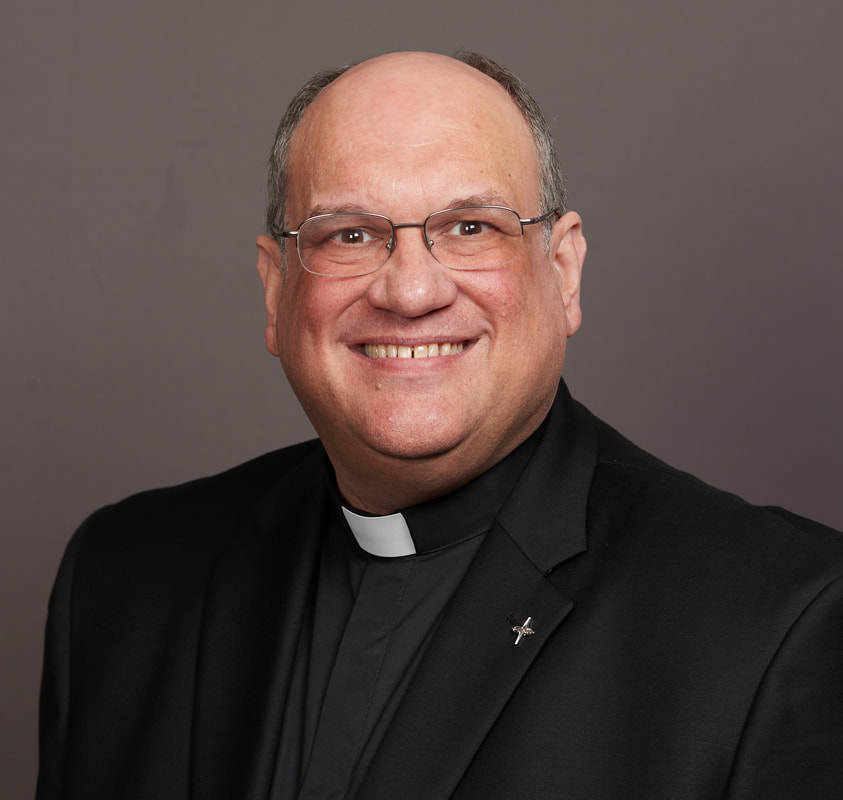
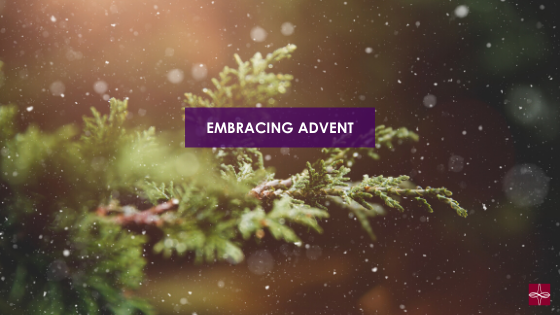

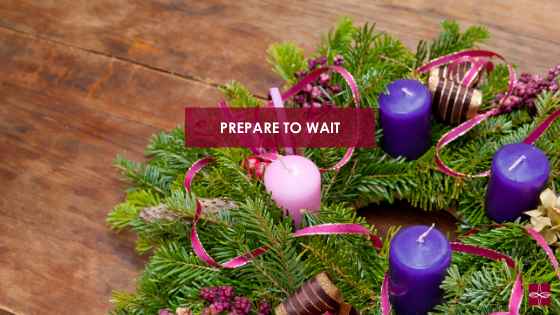

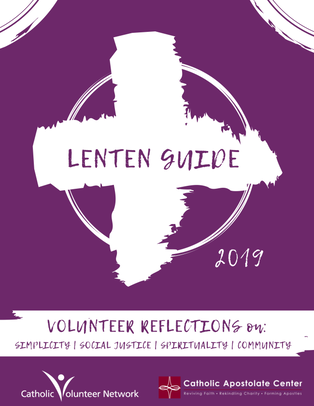
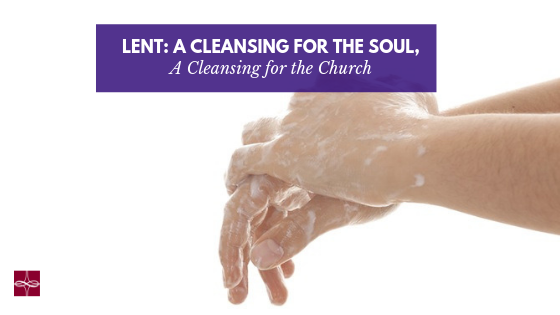

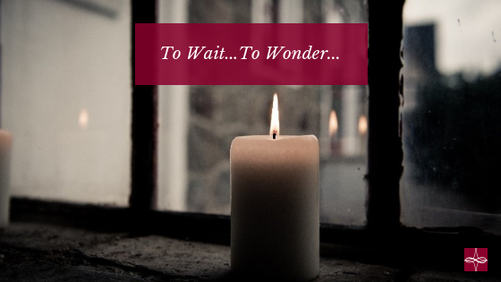

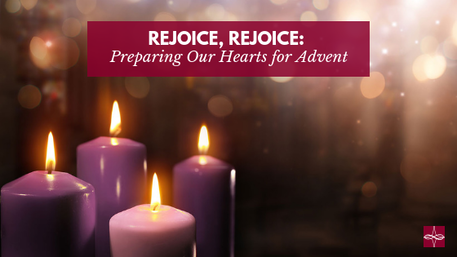

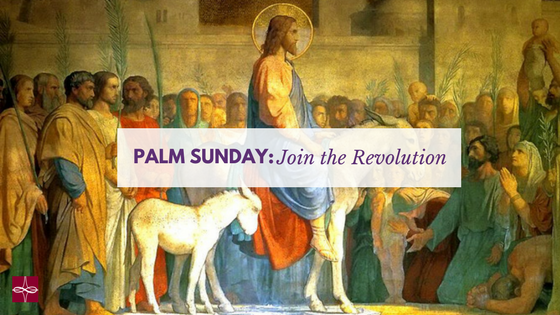

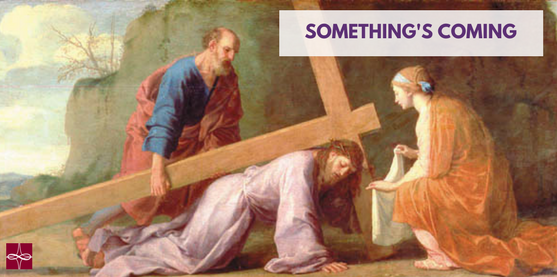

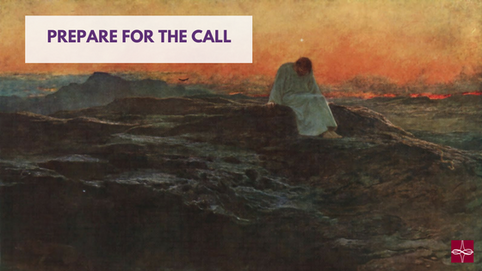

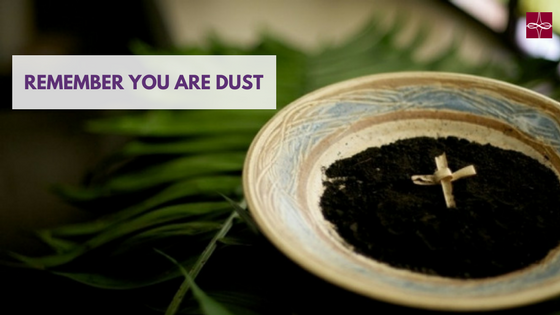

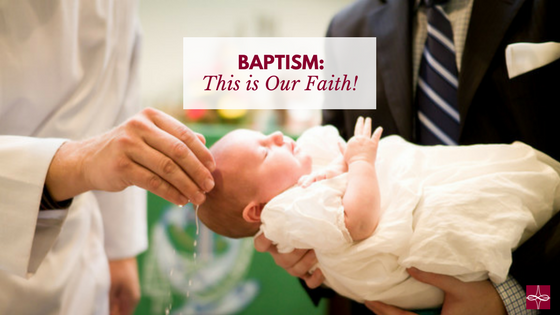

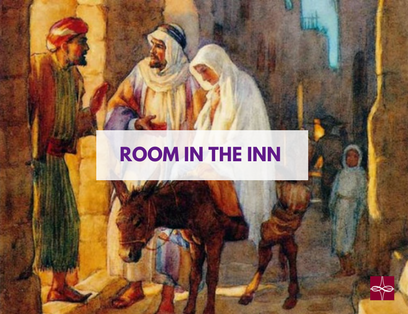

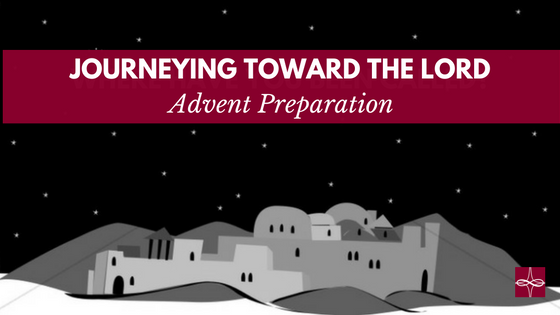


 RSS Feed
RSS Feed